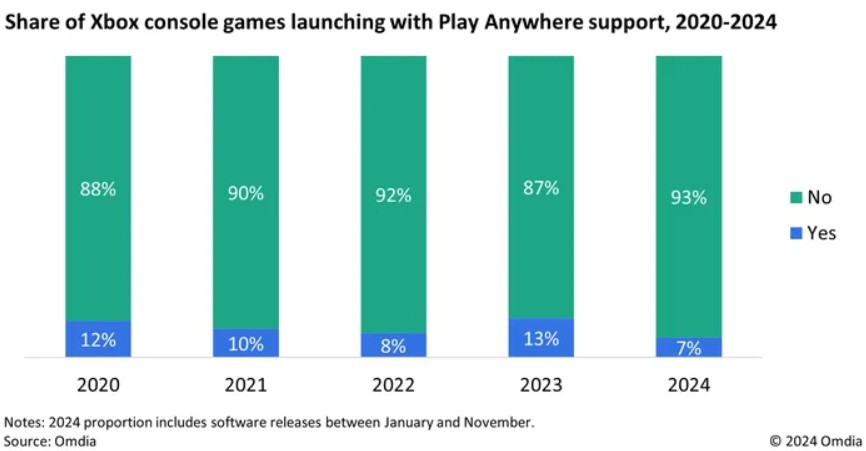Yesterday, I wrote a piece showcasing the problems with Microsoft’s current gaming strategy, which has ditched exclusive Xbox games in favor of service and feature differentiators. Common sense would suggest that with fewer exclusive games, fewer people will want Xbox consoles — which means fewer developers will want to make Xbox games, which means fewer people will want Xbox consoles, etc. Microsoft doesn’t seem worried (or perhaps doesn’t care), as it continues to put its former exclusives like Forza Horizon 5 onto PlayStation.
To that end, Xbox head Phil Spencer previously described how Xbox has more users than ever on console, and Xbox ecosystem features like Xbox Cloud Gaming continue to grow for the platform. Indeed, Microsoft says that Xbox will acquire users via feature differentiators in the future, with things like Xbox Game Pass, backward compatibility, and Xbox Play Anywhere.
Play Anywhere is particularly exciting, giving Xbox users the ability to take their games and save files to other devices. For me personally, the promise of being able to take my Xbox save files to my phone via cloud, or a Lenovo Legion Go PC gaming handheld is what keeps me inside the ecosystem. The problem is that so very few high-quality games actually support this functionality.
After my post yesterday, a user reached out to share this analysis from Omdia and GameDeveloper.com, which offers an actual breakdown for how few new games actually support Xbox Play Anywhere year over year.
As you can see, the percentage of games supporting Play Anywhere actually declined almost by half in 2024 year over year, and has remained relatively flat for the past five years.
The chart is a bit of an indictment for how the feature is going so far. Developers don’t seem to see the value in it, only opting-in as part of a marketing deal with Xbox, or a tie-in with Xbox Game Pass. Capcom titles like Kunitsu-Gami, Monster Hunter Rise, and Exoprimal only went into Xbox Play Anywhere because of their marketing deals. The bigger titles like Monster Hunter Wilds or Resident Evil 8 are nowhere to be seen.
Microsoft’s own games generally support Xbox Play Anywhere out of the box, for the most part, but many don’t. I had to buy the recent Diablo 4 expansion twice for PC and Xbox, for example, despite the fact it has cross-save support.
RELATED: It’s not exclusive games keeping me inside the Xbox ecosystem
If developers don’t see the value of Xbox Play Anywhere, or aren’t incentivized to organically support it, I would argue it’s not as compelling a “differentiator” as Microsoft seems to think it is. Indeed, Microsoft based an entire marketing campaign called “This is Xbox” late last year around Play Anywhere, which suggested users skip out on buying an Xbox console in favor of laptops and smartphones. Judging by Xbox’s hardware declines year-over-year, it seems they’re listening. Except the amount of high-quality games on those Xbox “phones” and “laptops” are vanishingly few when compared to a full-blown Xbox console — which Microsoft apparently seems less interested in actually selling than ever.
Microsoft is building out new hardware for next-gen, which will potentially bring Xbox and Windows PC closer together than ever before. Could it be that Xbox Play Anywhere becomes obsolete when the developer environment is simply “Windows” next-gen? The vision is amazing and exciting, but so far, the execution has been frustratingly underwhelming.





